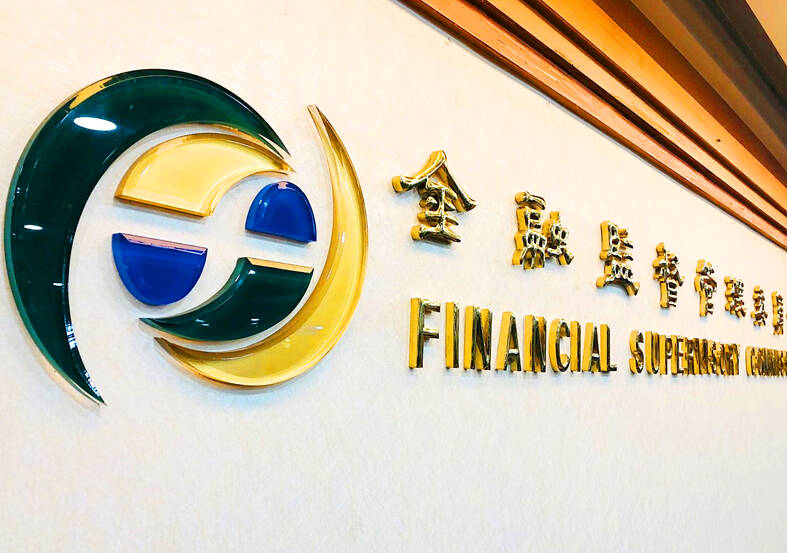The Financial Supervisory Commission (FSC) fined financial institutions and publicly listed firms a total of NT$107.07 million (US$3.29 million) in the first half of the year, about 2 percent lower than the NT$108.78 million imposed during the same period last year, data from the financial regulator showed yesterday.
The fines have reached about 38.98 percent of this year’s NT$274.68 million penalty target, the commission said.
The fines were given to correct the firms’ deficiencies, rather than as a means of generating income, it said.

Photo: Kelson Wang, Taipei Times
In addition to fines, the regulator’s penalties — issued by the Banking Bureau, the Insurance Bureau and the Securities and Futures Bureau — include corrections, improvements, warnings and restrictions, and a company can be required to dismiss or suspend directors, supervisors and managers.
In the first two quarters, the Banking Bureau imposed NT$39.66 million in fines, up 2.22 percent from a year earlier as it punished several banks for financial services misconduct and breaches related to internal controls and corporate governance, the data showed.
Among the severest penalties was a NT$12 million fine imposed on Taichung Commercial Bank Co (台中商銀) in February for oversight failures after chairman Wang Kuei-fong (王貴鋒) was found to have misspent more than NT$1 billion in corporate funds on personal luxuries.
The bureau imposed the second-highest fines of NT$8 million each on Shin Kong Commercial Bank (新光銀行) and Cathay United Bank (國泰世華銀行).
It punished Shin Kong in January, as the bank poorly exercised measures to prevent staff from misappropriating clients’ funds through online banking services and through improper financial dealings with clients, while Cathay United was penalized in March after a branch clerk misappropriated clients’ funds.
The Insurance Bureau issued NT$33 million in fines in the first six months, down 4.35 percent from a year earlier, with the largest fine of NT$9 million levied on the Taiwan branch of Cardif Assurance Vie’s (法國巴黎人壽).
The second-largest fine it gave was NT$6 million to the Taiwan branch of Cardif Assurance Risques Divers (法國巴黎產物保險).
Both fines were related to poor corporate governance and internal controls.
The Securities and Futures Bureau handed out fines of NT$34.41 million in the first half, down 4.31 percent year-on-year, with the largest being fines imposed on Time Securities Investment Consulting Co (時間投顧) and Cathay Securities Investment Trust Co (國泰投信) — NT$1.2 million each — for a lack of internal controls.

Taiwan will prioritize the development of silicon photonics by taking advantage of its strength in the semiconductor industry to build another shield to protect the local economy, National Development Council (NDC) Minister Paul Liu (劉鏡清) said yesterday. Speaking at a meeting of the legislature’s Economics Committee, Liu said Taiwan already has the artificial intelligence (AI) industry as a shield, after the semiconductor industry, to safeguard the country, and is looking at new unique fields to build more economic shields. While Taiwan will further strengthen its existing shields, over the longer term, the country is determined to focus on such potential segments as

UNCERTAINTY: Innolux activated a stringent supply chain management mechanism, as it did during the COVID-19 pandemic, to ensure optimal inventory levels for customers Flat-panel display makers AUO Corp (友達) and Innolux Corp (群創) yesterday said that about 12 to 20 percent of their display business is at risk of potential US tariffs and that they would relocate production or shipment destinations to mitigate the levies’ effects. US tariffs would have a direct impact of US$200 million on AUO’s revenue, company chairman Paul Peng (彭雙浪) told reporters on the sidelines of the Touch Taiwan trade show in Taipei yesterday. That would make up about 12 percent of the company’s overall revenue. To cope with the tariff uncertainty, AUO plans to allocate its production to manufacturing facilities in

COLLABORATION: Given Taiwan’s key position in global supply chains, the US firm is discussing strategies with local partners and clients to deal with global uncertainties Advanced Micro Devices Inc (AMD) yesterday said it is meeting with local ecosystem partners, including Taiwan Semiconductor Manufacturing Co (TSMC, 台積電), to discuss strategies, including long-term manufacturing, to navigate uncertainties such as US tariffs, as Taiwan occupies an important position in global supply chains. AMD chief executive officer Lisa Su (蘇姿丰) told reporters that Taiwan is an important part of the chip designer’s ecosystem and she is discussing with partners and customers in Taiwan to forge strong collaborations on different areas during this critical period. AMD has just become the first artificial-intelligence (AI) server chip customer of TSMC to utilize its advanced

Chizuko Kimura has become the first female sushi chef in the world to win a Michelin star, fulfilling a promise she made to her dying husband to continue his legacy. The 54-year-old Japanese chef regained the Michelin star her late husband, Shunei Kimura, won three years ago for their Sushi Shunei restaurant in Paris. For Shunei Kimura, the star was a dream come true. However, the joy was short-lived. He died from cancer just three months later in June 2022. He was 65. The following year, the restaurant in the heart of Montmartre lost its star rating. Chizuko Kimura insisted that the new star is still down